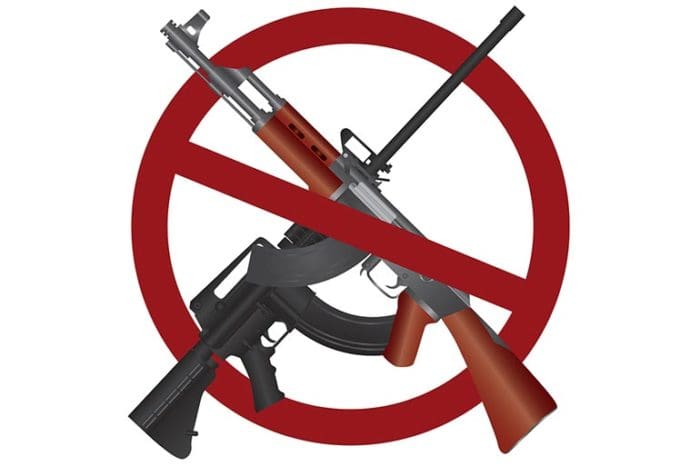Ross Ramsey of the Texas Tribune reports on a recent Texas Statewide Survey. His reporting, and the poll, leave something to be desired. Something like accuracy.
Texans support stricter gun laws, but some ideas are out of bounds, UT/TT poll finds
Let us start with what they really found.
Q28. In general, do you think gun control laws should be made more strict, less strict, or left as they are now?
The poll claims 51% want laws that are more strict. But an examination of the detailed questions and responses indicates that 68% of the respondents apparently don’t even know how strict current laws are.
“Requiring background checks for all gun purchases has overwhelming support in Texas, with 81% of registered voters saying that’s a good idea.”
Survey says:
Q29. Do you support or oppose requiring criminal and mental health background checks on all gun purchases in the United States, including gun shows and for private sales?
That’s the usual misleading question. By separating out “gun shows” and “private sales,” the question implies that all gun show sales lack background checks, whether private or through a licensed dealer.
Now ask the question this way: Should all private sales of firearms require a background check, with a permanent record of the transaction available to the government, and at the expense of the buyer?
“Support for so-called red flag laws, which allow courts to temporarily seize guns from people “determined to be a risk to themselves or others,” have the support of 68% of voters…”
In fact, there is no question regarding “red flag” laws anywhere in that poll. There is this:
Q30. Do you support or oppose allowing courts to require a person determined to be a risk to themselves or others to temporarily surrender guns in their possession?
That question describes existing law, not “red flag” laws. In every “red flag” (extreme risk protective order, et cetera) I have reviewed there are two characteristics which distinguish them from existing laws; a provision for no-due process, ex parte proceedings, and a lack of probable cause.
Usually the identity of the accuser is hidden from the subject of the confiscation order. If the 68% reported as supporting this think they favor a new law, they don’t know enough about existing laws to know they want stricter gun people control laws.
Ah, but if we take the question at face value, and assume the respondents do know the law, the real story is that better than 1 in 5 Texas voters don’t think courts should be taking firearms the way they do now.
Try this question: Do you support or oppose allowing courts to order the confiscation of firearms based on secret proceedings of which the subject is not informed, and based on no probable cause?
The answers might surprise them. If they’re honest.
Here is another another troubling statement from Ramsey which, again, doesn’t reflect an actual poll question.
“Bans on weapons are less popular overall, and the poll responses illustrate the power of that issue in a political campaign.”
The real question is:
Q31. Do you support or oppose banning the sale of selected semi-automatic rifles, often referred to as assault weapons?
First, that only asks about a ban on sales. Ramsey’s initial statement implies people support a ban on the firearms (à la Beto).
Second, the question was limited to “selected semi-automatic rifles” without specifying which ones. A related problem is that, offhand, I can’t recall an “assault weapon” ban which was limited to semi-automatic rifles; generally, they’re limited to neither semi-automatics, nor rifles.
Third, the use of the derogatory term, “assault weapon” has no place in an allegedly objective poll. Instead of implying that the ban would only target nasty things that “assault” people, define them:
Do you support or oppose banning the sale of firearms that accept detachable magazines and vaguely resemble military-style firearms, even if that includes your favorite deer rifle? (The very first rifle I bought specifically for hunting has been listed in nearly every AWB I’ve reviewed.)
I would actually break that question down farther, to include support/opposition of possession, and then of grandfathering possession/sales of existing firearms.
But enough about the laws. The pollsters had to go after the National Rifle Association.
Q42. Please tell us whether you have a very favorable, somewhat favorable, neither favorable nor unfavorable, somewhat unfavorable, or very unfavorable opinion of the National Rifle Association (NRA).
That standalone question is not helpful, unless your intent is to merely spout, Less than half of voters approve of the NRA. Just ignore them like you do your neighbors.
That, too needs some elaboration:
If you view the NRA unfavorably, is it because the NRA does too much for Second Amendment rights, too little, or some other reason?
If you view the NRA favorably, is it because the NRA supports Second Amendment rights, undermines Second Amendment rights, or some other reason?
Maybe the answers to those questions would finally be a wakeup call for the NRA Board of Directors.
Something about the poll’s methodology bothers me. At first glance, it seems good. They use a YouGov panel, in which they’ve selected respondents to represent Texas demographics, as indicated by the Census.
The fact that YouGov’s potential pool is assembled from self-selecting volunteers responding to Google ads could be a problem, but proper demographic matching should counter any pre-selection issues.
But then we have this:
For the survey, YouGov interviewed 1556 Texas registered voters between October 18 and October 27, 2019, who were then matched down to a sample of 1200 to produce the final dataset.
Perhaps a trained statistician can explain why, after the panel was selected to match state demographics, it was then necessary — or even desirable — to then “match down” the group to exclude nearly a quarter of the panel after they polled them.
